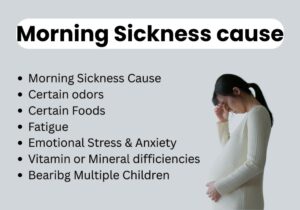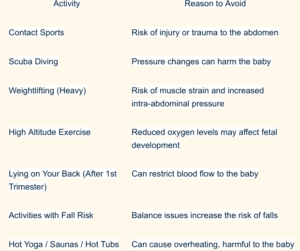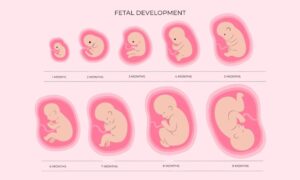 INTRODUCTION
INTRODUCTION
Pregnancy is a transformative journey filled with excitement, questions, and important
decisions—there is a different experience with different moms. Some are facing a kind of health
issue where they get more problems during pregnancy. The first trimester sets the foundation
for both the baby’s development and the mother’s well-being. That’s why expert-backed
Pregnancy Health Tips, practical First Trimester guidance, and trusted Advice for New
Moms are crucial during this stage. This article delivers the Top 25 Pregnancy Health Tips
every expecting woman should know, with a special focus on the first trimester and practical,
reassuring advice for new moms.
1. Confirm Your Pregnancy with a Healthcare Professional
As soon as you get positive results after a test with a pregnancy kit. Confirmation ensures
timely prenatal care and allows you to begin essential first-trimester screenings and health
checks. And if you are facing some health issues, then visit to doctor.
2. Begin Taking Prenatal Vitamins
Begin taking a daily prenatal vitamin right away. Ideally, you should start prenatal
vitamins at least one month before pregnancy—and CERTAINLY during the first 12
weeks of pregnancy when the baby’s development is at its most critical point.
3. Track Your Symptoms and Key Dates
Pregnancy symptoms can start as early as a week or two after conception, but many
women don’t notice them until around four to six weeks after conception. Some women
may experience no symptoms at all during the first trimester.
The due date may be
estimated by adding 280 days ( 9 months and 7 days) to the first day of the last
menstrual period (LMP). This is the method used by “pregnancy wheels”
4. Follow a Balanced, Nutrient-Rich Diet
Eat plenty of fruit and vegetables because these provide vitamins and minerals, as well
as fibre, which helps digestion and can help prevent constipation. Eat at least 5 portions
of a variety of fruit and vegetables every day – these can include fresh, frozen, canned,
dried or juiced.
● Leafy greens (rich in folate and iron)
● Lean proteins (chicken, beans, lentils)
● Whole grains (fiber and B vitamins)
● Dairy or fortified alternatives (for calcium and vitamin D)
Don’t consume high-mercury fish, undercooked meats, and unpasteurized cheeses.
5. Stay Hydrated Throughout the Day
During the first trimester, dehydration can increase the risk of headaches, constipation, and
fatigue, which is not good for a pregnant woman. Consume at least 8–10 glasses of water daily,
and consider adding a splash of lemon or cucumber for flavor.
6. Limit or Eliminate Caffeine and Sugar
Avoid tea, coffee, and artificial sugar during pregnancy. Excess use of these things may create a
situation of miscarriage and low birth weight. Limit caffeine intake to no more than 200 mg per
day. Cutting sugary drinks also helps stabilize energy and reduce nausea.
7. Avoid Alcohol, Tobacco, and Recreational Drugs
Drinking alcohol during pregnancy can affect the way your baby develops and grows in
the uterus (womb), your baby’s health at birth, and your child’s long-term health.
Drinking heavily throughout pregnancy can result in your baby having severe physical
and mental disability known as fetal alcohol syndrome (FAS).
8. Get Enough Sleep and Rest
Another study reports that the sleep you get in your first trimester can affect your
health in the third trimester. Women who don’t get enough sleep (less than five
hours per night) in the first trimester are nearly 10 times more likely to develop
preeclampsia late in pregnancy.2
9. Embrace Safe, Low-Impact Exercise
Gentle exercise during pregnancy is good (and safe) for you and your baby. Exercise
boosts circulation, reduces bloating, and helps regulate mood. Great first trimester
options include:
● swimming.
● cycling.
● outdoors or on a stationary bicycle.
● jogging.
● muscle strengthening exercises,
● including pelvic floor exercises.
10. Learn to Manage Morning Sickness
Morning sickness is primarily caused by hormonal fluctuations and metabolic changes
during early pregnancy.

11. Know the Warning Signs to Watch For
There are common signs and symptoms of a high-risk pregnancy that could indicate an
underlying health condition or potential pregnancy complications. if not all symptoms are normal.
Contact your doctor if you experience:

12. Schedule Regular Prenatal Appointments
First trimester: Minimum of 2-3 visits. The first confirms the pregnancy with a urine
test, and the second is the dating ultrasound around 8-10 weeks. If the dates are off
and you’re earlier than you thought (normal for those of us not going IVF), you would
go back for a follow-up ultrasound. Finally, you would have a Doppler check for a
heartbeat around 12 weeks. If you have NIPT testing (via Mom’s blood), you would
come in for that as well.
13. Understand Genetic and Diagnostic Tests
During your first trimester, you may be offered:
● Blood tests for anemia or infections
● Non-invasive prenatal screening (NIPT)
● Ultrasound scans
These tests help identify early developmental concerns or genetic risks.
14. Communicate Openly with Your Partner
Talking as partners and parents-to-be. Talking to each other openly and honestly
is one of the best ways to strengthen your relationship in pregnancy and beyond.
sharing feelings, concerns, and preferences with your partner, as well as
listening to their needs and perspectives.
15. Avoid Harmful Chemicals and Environmental
Hazards
While environmental exposure is how many diseases and conditions are acquired,
developing fetuses are particularly vulnerable to these. Stay away from harsh cleaning
agents, toxic beauty products, and chemical fumes. Opt for “pregnancy-safe”
alternatives labeled non-toxic, paraben-free, and BPA-free.
16. Keep a Pregnancy Journal
One of the simplest ways to keep a pregnancy journal is to embrace change by
capturing your weekly body transformation through photos. Each week, take a moment
to stand in front of a mirror or find a comfortable spot to document the subtle and
not-so-subtle changes happening to your body.
17. Build a Support System Early
Having a supportive social network during this time is essential for maintaining your
well-being, as it can help to reduce stress, depression, and anxiety, improve physical
health, and reduce the risk of pregnancy and birth complications.
18. Address Your Mental Health
Hormonal changes can trigger mood swings, anxiety, or depression. Addressing
mental health during pregnancy is crucial, as it significantly impacts both the
mother’s and the baby’s well-being. It involves recognizing potential issues,
seeking support, and implementing healthy coping strategies
19. Stick to Reputable Sources for Information
During pregnancy, it’s crucial to prioritize information from reputable sources to
ensure accurate and safe guidance. Focus on professional sources like midwives,
obstetricians, and general practitioners. Also, consult reliable websites and books
from trusted organizations.
20. Understand Your Maternity Leave and Benefits
In India, under the Maternity Benefit Act, 1961, a woman employee who has
worked for at least 80 days in the preceding 12 months is entitled to 26 weeks
of paid maternity leave. This leave can be taken up to 8 weeks before the
expected date of delivery and the remaining weeks after. Additionally, the
salary for the postnatal period is paid within 48 hours of delivery. Now is the
time to read your company’s maternity policies, insurance coverage, and
parental leave options. Planning early reduces financial stress later.
21. Limit Screen Time and Social Media Comparison
It’s generally recommended to limit screen time, including social media,
during pregnancy. Screen limit helps you to relax your mind. Constant
scrolling can lead to information overload and unnecessary anxiety. Follow a
few trusted experts and take regular digital breaks.

22. Know Which Physical Activities to Avoid
Activities with a high risk of injury, such as contact sports, or those involving
significant falls. Here is the list of physical activities to avoid.
23. Learn Fetal Development Week-by-Week
Fetal development is a complex and fascinating process that occurs over the course of
approximately 40 weeks, typically divided into three trimesters. Here is a week-by-week
breakdown of key milestones and developments during pregnancy:
First Trimester (Weeks 1-12)
 This stage is critical as the baby’s organs and structures begin to form.
This stage is critical as the baby’s organs and structures begin to form.
● Week 1-2:What happens: Pregnancy begins with ovulation and fertilization.
The fertilized egg (zygote) travels through the fallopian tube toward the
uterus. Development: No visible fetal development yet, but the body starts
preparing for pregnancy.
● Week 3:What happens: The fertilized egg becomes a blastocyst and
implants in the uterine lining. Development: Early cell division begins. The
placenta and the umbilical cord begin to form.
● Week 4:What happens: The embryo’s heart and circulatory system start to
form. Development: A small “heart tube” starts beating. The neural tube
(which will become the brain and spinal cord) forms.
● Week 5:What happens: The embryo measures about 1.5mm
long. Development: Limb buds appear (future arms and legs), and the heart
begins pumping blood.
● Week 6:What happens: The embryo’s size increases to about 4–6
mm. Development: Facial features, like nostrils and a primitive mouth, are
visible. The heart has a regular beat.
● Week 7:What happens: The baby’s size is about 1 inch long. Development:
Developing eyelids cover the eyes, and major organs like the liver, kidneys,
and intestines begin to form.
● Week 8:What happens: The embryo is now called a fetus. Development:
Limbs continue to grow, fingers and toes are becoming more distinct, and
facial features like lips and ears are formed.
● Week 9:What happens: The fetus is about 2.3 cm long. Development:
Eyelids are closed, and the reproductive organs start developing.
● Week 10:What happens: The fetus now has distinct human features, and
the length is around 3 cm. Development: The tail-like structure disappears,
and the baby starts moving inside the womb, though the movements cannot
yet be felt.
● Week 11:What happens: The fetus is about 4 cm long. Development: The
kidneys are functional, and tooth buds are forming.
● Week 12:What happens: The fetus is about 6–7 cm long. Development:
External genitalia begin to differentiate. The fetus starts swallowing and
practicing breathing motions.
24. Begin Financial and Lifestyle Planning
Start budgeting for future baby needs: diapers, crib, prenatal
classes, and maternity clothes. Also, consider life insurance or
starting a savings account. Financial and lifestyle planning during
pregnancy involves preparing for the arrival of a baby by assessing
your current financial situation, creating a budget, building an
emergency fund, and making lifestyle adjustments for a healthy
pregnancy. This includes understanding childbirth costs, optimizing
insurance coverage, and planning for career adjustments, says 1
Finance.
25. Trust Your Instincts as a New Mom
While advice is important, your intuition matters too. The body and brain’s
ability to pick up on physical and emotional changes. As soon-to-be mothers
wait for the arrival of their babies, there is a powerful instinct to create a
secure and nurturing environment for the little ones. Subtle changes and
cues, even before we consciously notice them.
Why These Pregnancy Health Tips Matter
First trimester pregnancy health tips are crucial Eating well during your
pregnancy helps support your baby’s development and has health and
wellbeing benefits for you. The basics of healthy eating still apply during
pregnancy, but there are certain nutrients you’ll need more of and certain
foods you should avoid.

